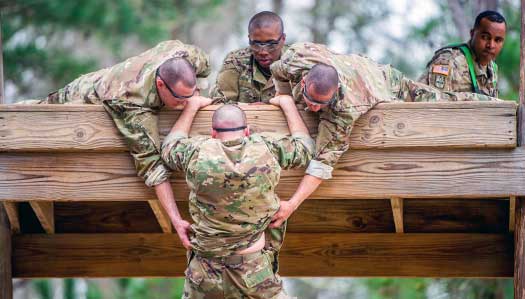 Fabiola Cardozo / NNOMY / español - Some elements make the popularity, frequency, and increased rate of the military enlistment of many young people possible. One of the most important is the influence they receive from their environment on the part of those people who act as counselors and teachers within the schools they attend, as well as from their parents or relatives at home. The normalization of militarization in American society leads us to think of military enlistment as a great option for young people’s futures. However, little is said about the real difficulties they will face. An adult who advises a teenager on military enlistment has naturalized war in a way that is not conducive to better decision-making on the part of young people, preventing the exploration of less violent alternatives. (See: http://peacefulcareers.org/index.html).
Fabiola Cardozo / NNOMY / español - Some elements make the popularity, frequency, and increased rate of the military enlistment of many young people possible. One of the most important is the influence they receive from their environment on the part of those people who act as counselors and teachers within the schools they attend, as well as from their parents or relatives at home. The normalization of militarization in American society leads us to think of military enlistment as a great option for young people’s futures. However, little is said about the real difficulties they will face. An adult who advises a teenager on military enlistment has naturalized war in a way that is not conducive to better decision-making on the part of young people, preventing the exploration of less violent alternatives. (See: http://peacefulcareers.org/index.html).
Within the school, some teachers and counselors receive encouragement from the Pentagon to influence and foster an interest in the military sector in young people. As we know, between students and teachers or counselors, there is an inherent power dynamic that gives educators almost unquestionable validity, leading to a dangerous influence. Likewise, the constant visits of military recruiters and the implementation of school programs that encourage entry into military service mean that young people are being permanently influenced by this idea. (See: https://nnomy.org/en/what-is-militarization/school-militarization.html).
The National Network Opposing the Militarization of Youth (NNOMY)
 Fabiola Cardozo / NNOMY / español - The rhetoric about the need for a military draft in American society is lost sight of in history. The patriotic struggle to defend the nation from possible threats and the urgency to demobilize alleged terrorism attempts and take democracy to other latitudes, has served to implement policies that perpetuate permanent war and make invisible or undermine the possibility of more democratic and pacifist mechanisms in international relations.
Fabiola Cardozo / NNOMY / español - The rhetoric about the need for a military draft in American society is lost sight of in history. The patriotic struggle to defend the nation from possible threats and the urgency to demobilize alleged terrorism attempts and take democracy to other latitudes, has served to implement policies that perpetuate permanent war and make invisible or undermine the possibility of more democratic and pacifist mechanisms in international relations.
Such has been the recurrence of this rhetoric that American society sometimes does not question the actions leading to warfare caused by the government in power. As mentioned in this article:
Yet celebrating the military, nobilizing the military experience, finding purpose and meaning in continuous war, is the very definition of militarism.
A true democracy has a military as a reluctant and regrettable choice, driven by the need to defend itself in a hostile and violent world.
…We’ve become so accustomed to living with the drumbeats of war that we no longer hear them…We’re hearing them all the time today — it’s the background noise to our lives. For some, it’s even become sweet music. But war and militarism is never sweet music to a functioning democracy.
(See: https://bracingviews.com/2015/07/23/the-united-states-of-militarism/)
Despite the potential that the US has, and that could be developed more efficiently to provide greater social welfare to its inhabitants and the rest of the world through inventiveness and technological innovation, it is a country that has assumed militarism and that seeks to lead with exports of weapons in conflict scenarios on a planetary scale.
 Kate Connell / Fred Nadis / Antiwar.com / español - In 2016-17, the U.S. Army visited Santa Maria High School and nearby Pioneer Valley High School in California over 80 times. The Marines visited Ernest Righetti High School in Santa Maria over 60 times that year. One Santa Maria alumnus commented, “It’s as if they, the recruiters, are on staff.” A parent of a high school student at Pioneer Valley commented, "I consider recruiters on campus talking to 14 year olds as "grooming" young people to be more open to recruitment in their senior year. I want my daughter to have more access to college recruiters and for our schools to promote peace and nonviolent solutions to conflict."
Kate Connell / Fred Nadis / Antiwar.com / español - In 2016-17, the U.S. Army visited Santa Maria High School and nearby Pioneer Valley High School in California over 80 times. The Marines visited Ernest Righetti High School in Santa Maria over 60 times that year. One Santa Maria alumnus commented, “It’s as if they, the recruiters, are on staff.” A parent of a high school student at Pioneer Valley commented, "I consider recruiters on campus talking to 14 year olds as "grooming" young people to be more open to recruitment in their senior year. I want my daughter to have more access to college recruiters and for our schools to promote peace and nonviolent solutions to conflict."
This is a sample of what high schools, particularly in rural areas, experience nationwide, and the difficulty of confronting the presence of military recruiters on campus. While our nonprofit counter-recruitment group, Truth in Recruitment, based in Santa Barbara, California, views such military access as beyond excessive, as far as the military is concerned, now that the pandemic has closed campuses, those were the good old days. The Air Force’s Recruiting Service Commander, Maj. Gen. Edward Thomas Jr., commented to a journalist at Military.com, that the Covid-19 pandemic and high school shutdowns nationwide have made recruiting more difficult than previously.
Thomas stated that in-person recruiting at high schools was the highest yield way to recruit teenagers. “Studies that we’ve done show that, with face-to-face recruiting, when somebody is actually able to talk to a living, breathing, sharp Air Force [noncommissioned officer] out there, we can convert what we call leads to recruits at about an 8:1 ratio,” he said. “When we do this virtually and digitally, it’s about a 30:1 ratio.” With closed recruiting stations, no sporting events to sponsor or appear at, no hallways to walk, no coaches and teachers to groom, no high schools to show up at with trailers loaded with militarized video games, recruiters have shifted to social media to find likely students.
 Gary Ghirardi / NNOMY - What began for the National Network Opposing the Militarization of Youth as an adjustment of our phone forwarding from an answering machine to a cell phone, revealed a bit of a surprise for our office this month of October 2020. What resulted were five phone calls within seven days of both young men and women seeking counseling on how to get out of the Delayed Entry program for military service that they had initially signed up for. All said that they had changed their minds; one for family issues being needed at home to help his mom during this difficult time of Covid. The other young men just did not want to go any longer with no explanation. Two young women, both more nervous than the men discussing such a decision with an unknown entity on the other end of a phone number they gathered from our website.
Gary Ghirardi / NNOMY - What began for the National Network Opposing the Militarization of Youth as an adjustment of our phone forwarding from an answering machine to a cell phone, revealed a bit of a surprise for our office this month of October 2020. What resulted were five phone calls within seven days of both young men and women seeking counseling on how to get out of the Delayed Entry program for military service that they had initially signed up for. All said that they had changed their minds; one for family issues being needed at home to help his mom during this difficult time of Covid. The other young men just did not want to go any longer with no explanation. Two young women, both more nervous than the men discussing such a decision with an unknown entity on the other end of a phone number they gathered from our website.
It became apparent that there were youth that were finding their way to the NNOMY DEP pages from searching Google for “Getting Out of the Delayed Entry Program.” NNOMY's “Getting Out” page is in our top 20 most popular web pages with 42,308 hits registering on NNOMY.org and the same article on our blog page, NNOMYpeace.net, registering 37,580 hits. The more generic DEP description page ranks number one most visited on both sites with 149,924 hits and 147,242 respectively. Getting Out on the NNOMY.org site comes up first on my Google search and fifth on the Bing search engine of the Microsoft Explorer browser. All our pages that refer to DEP have links to better places to call than us like the GI Rights Hotline or the Military Law Task Force but we still seem to be getting some calls as a result of the phone forwarding. We have put additional information on our DEP pages to make certain that those who wish to get out of DEP, can feel free to call, indicating we will put them in contact with a GI Rights counselor since this past week's experience of receiving calls .

Fabiola Cardozo / NNOMY / español - It’s widely recognized that the Covid-19 pandemic undoubtedly affects the economy and, as a result, also negatively affects healthcare, education, and culture. However, in the face of hard times like the ones we’ve experienced this year, national priorities are oriented through the policies implemented by political leaders.
A recent article by the Washington Post highlights how The Pentagon diverted taxpayer money originally meant for masks and cotton swabs to make jet engine parts and body armor.
"The Cares Act, which Congress passed earlier this year, gave the Pentagon money to “prevent, prepare for, and respond to coronavirus.” But a few weeks later, the Defense Department began reshaping how it would award the money in a way that represented a major departure from Congress’s intent.
The payments were made even though U.S. health officials think major funding gaps in pandemic response still remain. Robert Redfield, director of the Centers for Disease Control and Prevention, said in Senate testimony last week that states desperately need $6 billion to distribute vaccines to Americans early next year. Many U.S. hospitals still face a severe shortage of N95 masks. These are the types of problems that the money was originally intended to address."
 Gary Ghirardi / NNOMY - First disclosures: This Op-ed is being offered up by myself, Gary Ghirardi, for the September 2020 newsletter of the National Network Opposing the Militarization of Youth, themed: Teaching Kids to Kill, a vehicle of NNOMY's communications efforts to give voice to the few who stand up to endless wars and largely public ignorance and indifference to what is done in their names. It in no way reflects the opinions of the diversity of those organizations that collectively represent the bulk of groups, large and small, who offer up youth demilitarization efforts nationally in the not so United States of America.
Gary Ghirardi / NNOMY - First disclosures: This Op-ed is being offered up by myself, Gary Ghirardi, for the September 2020 newsletter of the National Network Opposing the Militarization of Youth, themed: Teaching Kids to Kill, a vehicle of NNOMY's communications efforts to give voice to the few who stand up to endless wars and largely public ignorance and indifference to what is done in their names. It in no way reflects the opinions of the diversity of those organizations that collectively represent the bulk of groups, large and small, who offer up youth demilitarization efforts nationally in the not so United States of America.
This Op-ed is short and not so sweet, like the Psychology Today Op-ed proceeding this in our lineup of offerings for the September NNOMY Newsletter. Short seems to be the new formula because people are adverse to reading long articles now and actually prefer videos where they only need to watch and maybe listen. Those have to be short also. Attention spans have shortened.
What has been stirring in my mind is not a popular idea likely to be supported by many if even a few. Yet I cannot escape this prescient thought about what is the business of the USA and its global military in this seemingly culminating moment of the November Presidential election in a few weeks time; kind of a not so calm thought before the storm that is likely coming.
If I am to take the rhetoric of the election as a guide to informing my thinking about our culture, I can only surmise that the televised back-and-forth serves only to maintain the status-quo with a faux battle over which dressing will be applied to coat the business of defending a dollarized global economy. After-all, isn't that what the project of the U.S. military really is?
I think back to all I have seen and those I have known in my intervening forty-two years of legal adulthood and the best formula for succeeding in this success driven culture is the endless and uncritical pursuit of wealth creation and the little power that can be acquired over others along the way with no holds barred.
Surveying the nativist and immigrant propensities to follow this path, I now believe the United States of America is a monster factory, and now franchised to a country near you. It seems like a harsh characterization on the surface to explain so many places and lives spread out over generations but those most successful adherents to the pursuit of the rewards of worshiping money and power above all other priorities, if we take those constant ques from our 24/7 media's talking heads, surely identifies us as cultural monstrosities.
"It's important that our youth understand that joining the military isn't the only way to pay for college or find stability in life."
Eoin Higgins / Commondreams -
 Rep. Alexandria Ocasio-Cortez on Monday proposed blocking the military from recruiting in schools, describing the practice as a predatory attack on disadvantaged children who already suffer from underfunded resources in their learning environments.
Rep. Alexandria Ocasio-Cortez on Monday proposed blocking the military from recruiting in schools, describing the practice as a predatory attack on disadvantaged children who already suffer from underfunded resources in their learning environments.
The proposal follows an amendment to the defense spending bill from Ocasio-Cortez, a New York Democrat, last week that would ban military recruiters from using video game streaming platforms to reach impressionable young people.
.@AOC, though an amendment to the defense spending bill, is seeking to block federal funding for military recruiters in middle & high schools.
“Children in low-income communities are consistently targeted for enlistment,” she says. https://t.co/NyWPDztR9D pic.twitter.com/APta1mOJd3
— Luke Broadwater (@lukebroadwater) July 27, 2020
